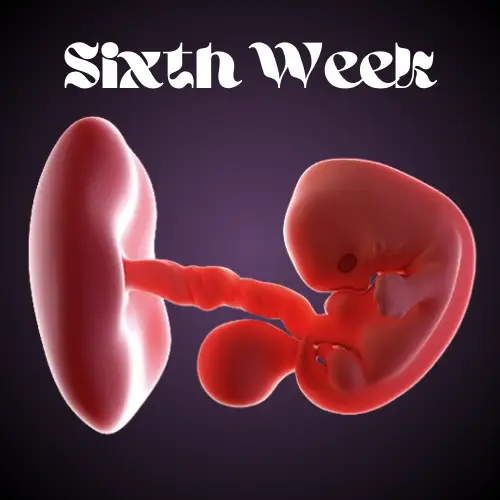Sixth Week of Pregnancy: Fetal Growth and Maternal Changes
Pregnancy is an incredible journey filled with excitement, anticipation, and a fair share of questions. The sixth week of pregnancy marks a significant milestone in your baby’s development and brings noticeable changes to your body. Whether you’re a first-time mom or experienced in pregnancy, this guide will walk you through everything you need to know about the sixth week of pregnancy.

What Happens During the Sixth Week of Pregnancy?
At six weeks pregnant, your baby is growing rapidly, and your body is adjusting to support this new life. This week is crucial for fetal development, as major organs and systems begin to form. Let’s dive into the details of what’s happening with your baby and your body.
Fetal Development at 6 Weeks
Your baby, now the size of a sweet pea or a baked bean (about 4-6 mm), is undergoing remarkable changes:
Brain and Nervous System Development:
The neural tube, which will become the brain and spinal cord, is forming.
The brain is dividing into different regions, and nerve cells are multiplying rapidly.
Heart Development:
Your baby’s heart is now beating at a steady rhythm (around 100-160 beats per minute).
In some cases, the heartbeat can be detected via a vaginal ultrasound.
Facial Features:
Tiny buds that will become eyes, ears, and a nose are starting to form.
The jaw, cheeks, and chin are also taking shape.
Limb Buds:
Small arm and leg buds are emerging, though they’re not fully formed yet.
Tail-Like Structure:
Your baby has a small tail, which will eventually disappear as development progresses.
Maternal Changes at 6 Weeks
While your baby is busy growing, your body is also undergoing significant changes to support this new life. Here’s what you might experience:
Physical Symptoms:
Morning Sickness:
Nausea and vomiting are common due to rising hormone levels (hCG).
Despite the name, morning sickness can occur at any time of the day.
Fatigue:
Your body is working overtime to support your baby, leaving you feeling exhausted.
Tender and Swollen Breasts:
Hormonal changes can make your breasts feel sore and sensitive.
Frequent Urination:
Increased blood flow to your kidneys and a growing uterus put pressure on your bladder.
Cramping and Spotting:
Mild cramping is normal as your uterus expands.
Light spotting can occur but should be monitored and discussed with your doctor.
Emotional Changes:
Mood swings are common due to hormonal fluctuations.
You may feel anxious, excited, or overwhelmed as you process the reality of pregnancy.
Tests and Scans at 6 Weeks
During the sixth week, you may have your first prenatal appointment. Here’s what to expect:
Ultrasound:
A vaginal ultrasound may be performed to confirm the pregnancy, check the baby’s heartbeat, and ensure the embryo is developing in the right location.
Blood Tests:
Your doctor may check your hCG levels, blood type, and overall health.
Urine Tests:
These tests can detect infections and monitor protein or sugar levels.
Do’s and Don’ts at 6 Weeks Pregnant
Do’s:
Eat a Balanced Diet:
Focus on foods rich in folic acid, iron, calcium, and protein.
Include fruits, vegetables, whole grains, and lean meats.
Stay Hydrated:
Drink plenty of water to support increased blood volume and prevent dehydration.
Take Prenatal Vitamins:
Ensure you’re getting enough folic acid, iron, and other essential nutrients.
Rest:
Listen to your body and take naps or breaks when needed.
Exercise Moderately:
Engage in light activities like walking or prenatal yoga.
Don’ts:
Avoid Harmful Substances:
Stay away from alcohol, tobacco, and recreational drugs.
Limit Caffeine:
Keep caffeine intake to less than 200 mg per day (about one cup of coffee).
Skip Raw or Undercooked Foods:
Avoid sushi, unpasteurized dairy, and undercooked meats to reduce the risk of infections.
Don’t Overexert Yourself:
Avoid heavy lifting or strenuous activities.
Frequently Asked Questions (FAQ)
Can I see my baby’s heartbeat at 6 weeks?
Yes, a vaginal ultrasound may detect the heartbeat, which typically starts around this time.
Is it normal to have no symptoms at 6 weeks?
Yes, every pregnancy is different. Some women experience few or no symptoms.
What should I do if I experience cramping or spotting?
Mild cramping and light spotting can be normal, but consult your doctor if it’s severe or accompanied by heavy bleeding.
How can I manage morning sickness?
Eat small, frequent meals, stay hydrated, and try ginger tea or crackers.
When should I call my doctor?
Contact your doctor if you experience severe pain, heavy bleeding, or persistent vomiting.
Expert Advice
Dr. Sarah Johnson, a renowned obstetrician, shares her insights:
“The sixth week of pregnancy is a critical time for fetal development. It’s important to focus on a healthy diet, take your prenatal vitamins, and avoid harmful substances. If you have any concerns, don’t hesitate to reach out to your healthcare provider.”
Conclusion
The sixth week of pregnancy is an exciting and transformative time for both you and your baby. While the physical and emotional changes can be challenging, they’re all part of the incredible journey of bringing a new life into the world. Take care of yourself, stay informed, and don’t hesitate to seek support from your healthcare provider.
